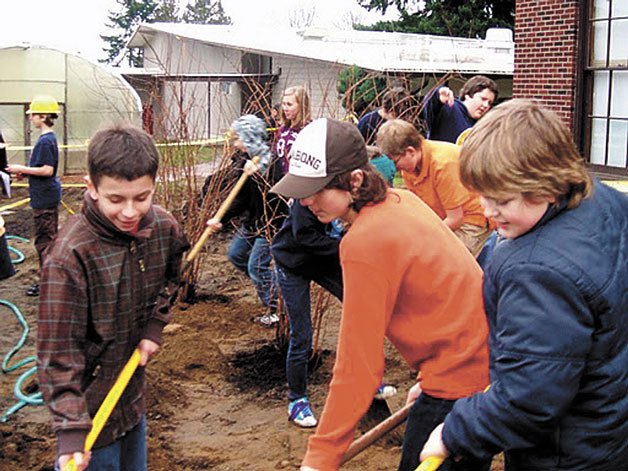With the help of a grant from the South Whidbey Schools Foundation, together with funding provided by Learn and Serve America, Langley Middle School science teacher Jay Freundlich and his sixth-grade science students have solved a big and very wet problem for their school by constructing a new rain garden between the library building and the science building.
The rain garden includes a series of berms, a catch basin, natural mulch material and appropriate plantings to both absorb and redirect the water so that it no longer threatens the lower classroom.
The innovative project allowed the students to get real world experience in solving a civil engineering problem using sustainable environmental principles. They helped design the rain garden and did much of the work themselves.
“Before this project, when it rained hard, sheets of water would wash over this area down to an inadequate drain, and then eventually flood into our classroom,” Freundlich said.
“The students not only got to put their classroom learning about the environment to work, but they also helped make their school environment better and safer,” he said. “This is project-based learning at its best.”
The area where the rain garden was constructed originally was designed to have a small patch of grass.
According to Freundlich, “the architects just specified that an inch or two of topsoil be placed over the native soil and planted with a lawn. Of course, over time, the kids walked on it and compacted the soil into hardpan, which killed the lawn and prevented the underlying sandy soils from absorbing rainwater. We removed the hardpan layer, introduced new plantings and lots of mulch, and re-graded the area to carry excess water to a basin where it can be slowly absorbed.”
The rain garden project had been planned by the school district for a couple of years, but due to budget constraints it was not moving forward. With the availability of a $1,000 grant from the foundation and additional funding from Learn and Serve America, Freundlich was able to get the project moving and give his sixth graders an opportunity to enjoy a valuable learning experience while making an important improvement to the school. Several of the students are now documenting the process of designing and building the rain garden in a short video.
“This project exemplifies the kind of innovative, high-impact educational enhancement that the foundation is able to facilitate with the money we raise,” said John Knox, foundation board member. “We look forward to the generous support of our community, especially in these difficult budget times, so that the South Whidbey schools can continue to provide an excellent and meaningful education for our children.”
The South Whidbey Schools Foundation plans to show the rain garden video at its upcoming gala dinner event on Saturday, May 21 at Useless Bay Golf & Country Club.
For more information about the foundation and the gala, go to www.southwhidbeyschoolsfoundation.org.



